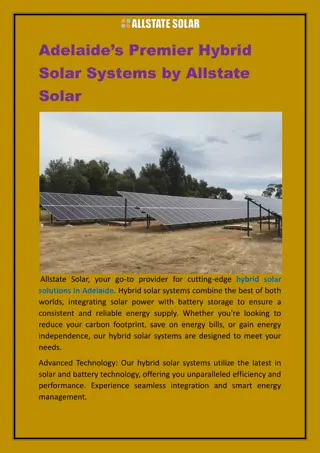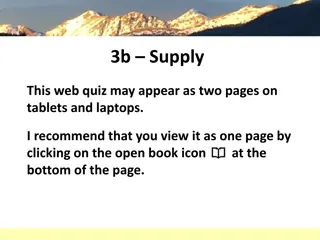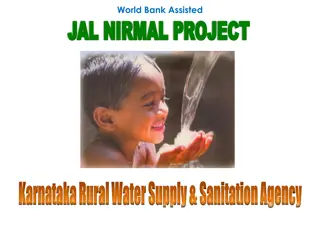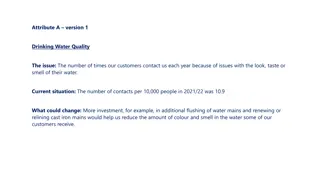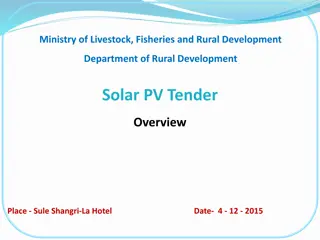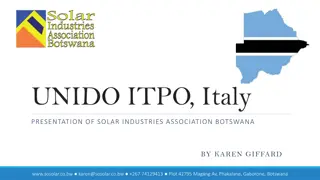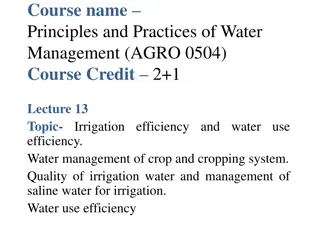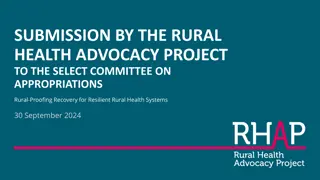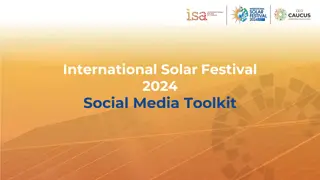Assured Water Supply to Every Rural Household: Sustainable Solutions with Solar-Based Systems
Ensure safe water supply to rural areas through solar-based systems. The goal is to provide potable water to every individual at affordable costs. Challenges include high maintenance costs and lack of skilled manpower. The sustainable solution lies in harnessing solar energy for water supply, focusing on remote and tribal areas for implementation. The vision is in alignment with the national goal of using solar power for a better future.
Download Presentation

Please find below an Image/Link to download the presentation.
The content on the website is provided AS IS for your information and personal use only. It may not be sold, licensed, or shared on other websites without obtaining consent from the author. Download presentation by click this link. If you encounter any issues during the download, it is possible that the publisher has removed the file from their server.
E N D
Presentation Transcript
Assured water supply to every rural household - Solar based water supply system for isolated & small Hilly/ Forested/ Tribal habitations 19th December, 2020 Presented By : Harish Kumar Hingorani Retired Engineer-in-Chief, Public Health Engineering Department, Chhattisgarh 1
GOAL In consonance with the declared national policy i.e. JJM (HAR GHAR JAL), National goal is to provide safe & potable water to every rural person with adequate (minimum 55 LPCD) of prescribed water quality (BIS10500) for domestic needs i.e. drinking, cooking, bathing, flushing etc. & other basic needs i.e. institutional, livestock, firefighting etc. as per needs on regular sustainable basis at all times in all situations at affordable service delivery charges through (FHTC) at household level over design period. 2
REQUIREMENT To ensure water service delivery on regular basis & at affordable cost, calls for adoption of an appropriate & suitable technology options for community managed water supply systems which may result in optimization / minimization of OPEX. Reduction / Minimization of power bills Optimization of chemical cost Minimal requirement of human resources in O&M Easy to operate and maintained by local community CHALLENGES Community cannot afford to pay high running & maintenance cost on account of power bills (60-70% of O&M cost) which leads to non functioning of rural water supply systems. Non availability of appropriate skilled manpower for operation & maintenance of water supply system at village / habitation level. Erratic and non availability of electricity as well as high voltage fluctuation. High cost for extending the grid. 3
SUSTAINABLE SOLUTION With due consideration to availability of good solar radiation in most part of country. Based on the techno-economic feasibility and viability in consideration with LCA the most appropriate option can be harnessing of solar energy for use of various purposes. SWPS is a sustainable solution for drinking RWSS. Can be standalone or grid tied for mini / small & MVS water supply schemes. Under the JJM programme it has been decided to provide Solar energy based pumping systems to ensure minimization of recurring cost of energy. Priority should be given for remotely located small / hilly terrain with higher lift / forest / tribal habitation / villages preferably SC/ST dominated population. SWP based can be installed and commissioned in shorter span of time. As per Department of Drinking Water Supply & Sanitation 71.95% habitations are having population less than or equal to 500. An appropriate and sustainable solution can be solar water pumping system for provisioning of safe and potable water which can be a cost effective solution & low hanging fruit to achieve the FHTC target & provisioning of water supply schools, anganwadi & Other institutions in time bound manner. 4
VISION Honorable Prime Minister of India in his Independence Speech on 15th August 2020 has mentioned about the mega plan of use of solar power ONE SUN ONE WORLD ONE GRID 5
KEY REQUIREMENTS FOR PLANNING & DESIGN - SWPS SN Components Description 01 Village Habitation Details / Name of Village/Habitation, block & district Location of village / habitation - Latitude & Longitude 6
KEY REQUIREMENTS FOR PLANNING & DESIGN - SWPS SN 02 Components Planning Design Period Description & SN Description Design Period in Years 01 A 02 Source Ground Water Solar Water Pumping System Pump House Civil works Pump and Controller Solar Panels Water Treatment Units if any Conveyance 20 A B C D E 10 10 10* 10# 20# 7
KEY REQUIREMENTS FOR PLANNING & DESIGN - SWPS SN Components Planning Design Period Description & SN Description Design Period in Years F Storage i. RCC Structure ii. Prefabricated Storage (HDPE / PVC) iii. Prefabricated Storage (MS) Distribution Network Functional Household Connections * Solar panels life is to be considered plus 20 years. Hence planning to be phased with the requirement of functional life of pumps and its stage i.e. 10 years and solar panels can be further augmented later on for the next stage. 20*** 10*** 20*** 20# 20# G H Tap 8
KEY REQUIREMENTS FOR PLANNING & DESIGN - SWPS SN 03 Components Lag Period ( Planning Execution Period) Description SN Phase Proposed Period in months and 01 02 03 Planning & Mobilization Implementation Post implementation i/c testing 04 06 02 commissioning period Total Ref : JJM Operational guidelines para 6.1.1 12 04 Project Stages 1. Initial Stage : Base Year + Lag Period 2. Intermediate Stage : Base Year + 10 yr + Lag Period 3. Ultimate Stage : Base Year + 20 yr + Lag Period 9
KEY REQUIREMENTS FOR PLANNING & DESIGN - SWPS LAYOUT PLAN FOR SWPS House Hold Static Water Level Draw Down Level 10
KEY REQUIREMENTS FOR PLANNING & DESIGN - SWPS SN Components Description 05 Basic Planning Consideration for Installation Physical field survey to identify the location for installation of array. Required shadow free area for solar panel installation, placement - south direction & required tilt angle @ latitude of specific location. No power line should be passing over & above installation site of panel array. Sufficient space for array installation should be available with the provision of future expansion too. Array should be installed at minimum height of 2.5 m. Preferably adjoining to storage tank staging. Availability of Government land / building should be preferred for installation of storage & Solar Array. Preferably distance between pump and panel array should be kept minimum. Assessment of Design water demand & TDH Identification of Site specific peak sun shine hours Solar 11
KEY REQUIREMENTS FOR PLANNING & DESIGN - SWPS SN 06 Components Identification of Peak Sunshine Hour (PSH) Description Site Specific Monthly radiation Level Monthly Average Radiation in Hrs Bhopal Max 7.17 6.96 6.26 6.12 5.82 5.53 Min 5.27 4.89 4.8 4.66 4.4 4.24 Jan Feb Mar Apr May Jun Jul Aug Sep Oct Nov Dec 12
KEY REQUIREMENTS FOR PLANNING & DESIGN - SWPS SN 07 Components Demographics Description Study and analysis of past trend of population & house hold data with SC / ST details Estimation of future population & households for various stages of planning period. 08 Per Water and Assessment of water demand Capita Supply SN Water Needs Water Requireme nt Water Demand in LPCD 01 Domestic Needs& Non Domestic Personal Hygiene & Hand Washing Needs Institutional needs 55 02 10% 5.5 03 5% 2.75 04 Lines Losses 1+2+3 7% 4.43 Total 67.68 say 68 13
KEY REQUIREMENTS FOR PLANNING & DESIGN - SWPS SN Components Description 09 Identification of safe & sustainable source/s to meet requirement of desired water quantity and quality. Source/s may be existing / new. Assessment of summer safe yield/discharge in consideration with minimum PSH & lean period draw down. Minimum Lean period safe yield for design purpose should be preferably equal to or greater than 3000 LPH. Considering the limitation of safe yield more than one source can also be considered. Source 14
KEY REQUIREMENTS FOR PLANNING & DESIGN - SWPS SN 10 Components Conveyance Main (Source to Storage) Description Economical size of conveyance main should be designed in accordance with CPHEEO manual. Pipe Material : Should be as per site specific needs & pressure requirement -HDPE Grade 100 PN 8 & GI class medium (for Hilly Terrains). Pipe material should be considered having higher pipe carrying capacity C . Assess frictional head to be encountered for design discharge and diameter. Minimum Diameter : HDPE 63 mm OD / GI 65 mm. 15
KEY REQUIREMENTS FOR PLANNING & DESIGN - SWPS SN Components Description 11 Total Head (TDH) Design Determine Total Dynamic Head (TDH) for pump design i.e. sum of static head, draw down, pressure head, velocity head and frictional losses etc in conjunction with summer and winter solar radiation hours for location specific. 16
KEY REQUIREMENTS FOR PLANNING & DESIGN - SWPS SN 12 Components Design Solar Pumping System Description Design can be carried out with the following formula Brake Horse Power (HP) = (Q X TDH)/{75 X operating efficiency ( )} Where Q = design discharge for Ist Stage in LPS , ( ) = combined operating efficiency of pump & motor in consideration with BEP in percentage. TDH in meters Motor power input in KW = 0.746 X HP of 17
KEY REQUIREMENTS FOR PLANNING & DESIGN - SWPS SN Components Description 13 Requirement of Solar Pump Need selection of an appropriate commercially available pumping system as per site specific requirements Recommended to provide DC pumps as per requirement. Pump material should withstand with corrosion & abrasion i.e. SS316. Preferably Helical rotor pump with Brushless DC motor to be provided. Motor should start as early as possible in low voltage / hazy conditions. IP65 rated environmental protection for motor and cables. 18
KEY REQUIREMENTS FOR PLANNING & DESIGN - SWPS SN 14 Components Solar Array Mounting Structure Description While determining the array sizing due consideration should be given for various losses for the specific location on account of temperature, de-rating of array and motor, cable losses, dirt loss, mis-match losses in array, shading, low radiation etc. Accordingly array sizing should be worked out to ensure required input power to motor over the design period. Loses can be in- between 50 to 80% as per site specific conditions. Accordingly determine accordance to meet requirement of input power. Sizing should be in consideration with tracking / non- tracking of system. Sizing needs to be done to meet the requirement of power, voltage & Current. Panel & required array size in 19
KEY REQUIREMENTS FOR PLANNING & DESIGN - SWPS SN Components Solar Array Mounting Structure Description Array sizing should be determine in such a way that solar pumping system should operate as early as possible on minimum required voltage in morning as well as should stop late in evening to ensure pumping of sufficient quantity of water. Monocrystalline perc panels are being suggested for use in drinking water system as such having higher cell operating efficiency. Panels should be provided of A grade quality. Positioning of Array Panel & True Facing South Latitude 20
KEY REQUIREMENTS FOR PLANNING & DESIGN - SWPS SN Components Solar Array Mounting Structure Description Necessary accessories & fittings, cables and electronics, protection devices like lighting arrestor, earthing & other balance of system (BOS) etc. should be provided as per MNRE guidelines & technical specifications. Mounting structure design wind loads of 200 km /hr. Prefabricated Mounting structure as per design in consideration with dead load, live load, wind load etc. Having galvanizing with minimum of 120 micron zinc coating. Panel & 21
KEY REQUIREMENTS FOR PLANNING & DESIGN - SWPS SN 15 Components Storage Description Storage is to be fixed as under 1.50% of Ist stage water demand 2.Cloudy period water demand for 2 days @ 15 LPCD. Tank Storage is being considered in place of battery storage For mini piped water commercially available / Metallic prefabricated tanks should be provided subject to commercial availability, easy of transportation and operation & maintenance. Staging shall be fixed in accordance with the required min. pressure (5 m) at ferrule point of small dwellings houses and topographic conditions but in no case staging should be less than 6m. Suitable cost effective disinfection system must be provided as per needs. supply schemes HDPE 22
STORAGE Lightening Arrestor MH Cover Disinfection Unit Float Valve Container Water Meter Buffer Storage for cloudy period Railing Inlet Pipe Staging Staircase Pressure Gauge GL Outlet 2 NRV Sediment / Silt Filter / Silt Filter Sediment Valve Valve Earthing Outlet 1 23 Pump
KEY REQUIREMENTS FOR PLANNING & DESIGN - SWPS SN Components Description Water distribution system should be designed with the peak factor as 3. Pipe Material: As per site specific needs & pressure - HDPE Grade 100 PN6 plain areas & GI Pipe medium class for hilly terrain Minimum Diameter 63 mm OD for plain areas. For the hilly terrain minimum diameter of 50 mm. Pipes having higher pipe carrying capacity i.e. value of C should be considered. FHTC to be provided as per JJM guidelines. To be provided in an around the Solar Pumping System Area 16 Water Distribution Network 17 Fencing 24
KEY REQUIREMENTS FOR PLANNING & DESIGN - SWPS SN 18 Components Warranty Description Warranty of Solar Water Pumping system should be as per MNRE guidelines Annual Maintenance Contract should be as per MNRE guidelines i.e. 5 years. 19 Annual Maintenance Contract Preventive Maintenance 20 Cleaning of panels should be done at the interval of 1 to 2 months. Pump should be tied and hanged with the support of plastic rope to ensure safety. Inspection / maintenance of electronic and electrical components / cables should be carried out minimum 2 times a year or as per requirement. 25
KEY REQUIREMENTS FOR PLANNING & DESIGN - SWPS Case - 2 Case - 1 TW 2 Safe Yield 2000 LPH Availability of water 11000 LPD 300 m 1.5 HP TW Safe Yield 4000 LPH Availability of water 22000 LPD 3 HP TW 1 Safe Yield 2000 LPH Availability of water 11000 LPD 1.5 HP Population 250 WD : 20125 LPD Population 250 WD : 20125 LPD 26
CASE STUDY MADHYA PRADESH Village : Birkhedi Block : Obedullganj District : Raisen (MP) Present Pop. : 740 Source : TW Type of Scheme : Solar Based 5 HP Panel Size : 8 KW Tariff : Rs.100/- pm/HH O&M : PM Rs. 6000/- Revenue : PM Rs. 10000/- Maintained by : Gram Panchayat
CASE STUDY - CHHATTISGARH Village : Paundha Block : Patan District : Durg (CG) House Hold : 22 Live Stock : 580 Source : TW Type of Scheme : Solar Based 1 HP Panel Size : 675 W Staging : 6 m Storage : 5000 Litres
THEMATIC STUDY MADHYA PRADESH Multi Village Water Supply Scheme Mardanpur District Sehore consist of 189 villages and 2 small towns. Source River Narmada. Capacity : 22 MLD, Serving population of 2,72,602 souls. Commissioned in Aug 2017. Install Raw and Clear water Pumps capacity 200 / 360 HP pumping hours 23. Annual O&M cost 6.5 crores consist of power bills of 4 crores approximately. Cost of production of water Rs. 11 per thousand litres not affordable. Suggested installation of grid tied solar system to meet the power requirement of said water supply system. Installed Capacity can be 4125 KW/HR. Estimated cost of installation of system works out to Rs. 19.00 crore approximately. Can be considered under Retrofitting of JJM to ensure O&M sustainability & affordability. Annual O&M cost can be reduced to Rs. 2.5 crores with the installation of grid tied solar system. Cost of production of water per KL come down to Rs. 4.25 which can be affordable by community
CASE STUDY - PUNJAB Village : Chilla, Tehsil : SAS Nagar, District : SAS Nagar Present Population : 863, Household : 149, Livestock : 142 FHTC : 133 , Source : 1 TW Motor HP : 20 HP Depth : 40 m Average daily Pumping Hr : 9 Annual Power Bill : Rs. 4.25 Lacs Appox Water Produce : 2,90,000/- litres per day Layout Diagram of Remote Monitoring System 30
CASE STUDY - CHHATTISGARH Solar Operated Standalone IRP using upflow roughing filters Block Korba 31
THANKS 32






